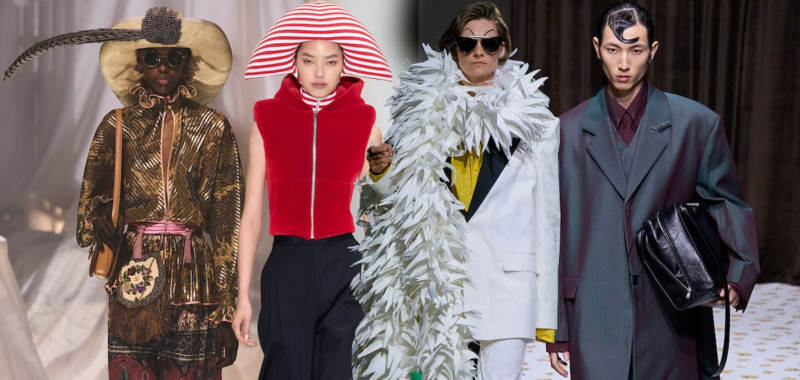
The author has shared a Podcast.You will need to accept and consent to the use of cookies and similar technologies by our third-party partners (including: YouTube, Instagram or Twitter), in order to view embedded content in this article and others you may visit in future.
Subscribe to the BoF Podcast here.
Background
Amid economic uncertainty, a global luxury industry slowdown and conflicts erupting around the world, designers at the Spring/Summer 2025 shows grappled with balancing restraint and expression, leading to collections that sought to make deeper emotional and intellectual impact. Meanwhile, megabrands scaled back extravagant festivities surrounding fashion week as they batten down the hatches with budget cuts and streamlined shows.
âI think thereâs a general caution and a realignment. I think the state of the world is more conducive to reflection than extravagance,â says Tim Blanks, The Business of Fashionâs editor-at-large.
But it was the designers who took creative risks that stood out most. At Marni, Francesco Risso created a cinematic spectacle that transformed a humble material like cotton into expressive designs, emphasising simple beauty amid global turmoil. Alessandro Michele made his highly anticipated debut at Valentino, honouring the legacy of founder Valentino Garavani while infusing his own signature flair. And at Loewe, Jonathan Anderson, played with scale and perspective, encouraging audiences to engage with unusual silhouettes and to rethink traditional aesthetics.
In this episode of The BoF Podcast, Imran Amed sits down with Tim Blanks to unpack the highlights of Fashion Month, discussing how the current global climate is influencing designers and brands.
Key Insights
- In his eagerly awaited debut for Valentino, Alessandro Michele seamlessly integrated his unique creative approach with the storied heritage of the house. Blanks describes the collaboration as âa natural consummation … like lovers meeting after decades of being apart and that kind of explosion of joy.â
- Sabato De Sarnoâs recent work at Gucci reflects the complexities of redefining a brand with a rich and influential legacy. While attempting to honour Gucciâs heritage, his collections have faced criticism for lacking the distinctive and bold creative direction of his predecessors. Blanks remarks, âthe problem is creating a new story for Gucci when the old stories are just so overpowering.â
- At Loewe, Jonathan Anderson continued to push boundaries by experimenting with scale and perspective. Andersonâs designs included oversized hoop skirts that seemed to hover, playing with perceptions of form and movement. âHe likes to challenge peopleâs points of view,â Blanks observes, adding that Anderson provokes thought âby showing them something that makes them wonder, how would I wear that? How would I sit in that?â
- Emerging designer Duran Lantink made a strong impression with his collection featuring extreme shapes refined into more wearable forms. âThose clothes are a physical realisation of independent thinking. What we need is more independent thought … fashion needs more of that,â Blanks says.
- Amed echoes the importance of nurturing new talent, saying, âI think the future of the fashion industry is in good hands with some of these younger designers that havenât necessarily had a big role in a house yet but certainly deserve an opportunity to show what they can do. I think thatâs part of what we need in the industry â to move away from this lack of risk-taking. Safety and being safe, thatâs just boring.â
Additional Resources
- In Paris, the Boys Canât Help It! Fearless idiosyncrasy is an irresistible asset for Jonathan Anderson at Loewe and Daniel Roseberry at Schiaparelli, writes Tim Blanks.
- Beauty Is Still Defiance. Rick Owens has always said so, but Chloé’s Chemena Kamali is also turning prettiness into a surprisingly potent force, writes Tim Blanks.
- What Does Pressure Look Like in Milan? Gucciâs Sabato De Sarno and Moschinoâs Adrian Appiolaza are both weighed by legacy. But life is much easier for one of them, writes Tim Blanks.

